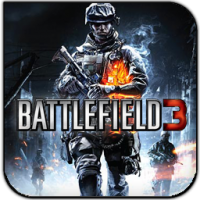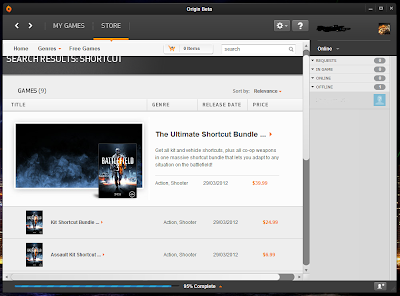Imagine a scenario where one day you start up Battlefield 3, check your stats and proudly gaze upon the hundreds of hours and earned achievements. Confident, you get on a multiplayer server and find yourself repeatedly dispatched by low level players with really big guns.
Thinking it's just a bad server you move on to another only to have it happen again and again. Why? because they took advantage of a leg up from EA and now have access to resources you haven't earned yet.
That's a very real possibility now with Thursday's release of new add-on packs for Battlefield 3. Don't confuse these with DLC packs, however, this is something entirely different and a portent of things to come in online gaming.
Go to EA's Battlefield website and you can purchase everything from clothing to a novel based on the game. Now EA is offering a new option called "Shortcut Kits" These "Kits" allow less experienced players on the PC and PS3 to gain all the weapons and vehicle options available in a player class or discipline (air or ground) as well as co-op weapons for $7 to $18 per "Kit".
If you're the type that just has to have it all you can also purchase a "Kit" that includes all the upgrade items for $39. Most importantly it's available without the usual time investment necessary to acquire the good stuff.
 EA is very forthcoming about the purpose of these kits. On the official Battlefield Blog, DICE's Tommy Rydling cites the purpose of the "Kits" as, " the perfect way to gain some ground on the veterans online".
EA is very forthcoming about the purpose of these kits. On the official Battlefield Blog, DICE's Tommy Rydling cites the purpose of the "Kits" as, " the perfect way to gain some ground on the veterans online".
There's two flaws in the logic of offering these kits for a game like Battlefield 3.
EA may be signaling an attempt to adopt the profitable MMO free to play, pay for upgrades model. The problem for a game like Battlefield 3 is that it's neither free nor is anything else connected to the franchise.
MMO's depend on either subscription or upgrades for revenue but rarely will the paid content threaten the investment (financial or otherwise) of veteran players. Most content such as the myriad of hats available in Team Fortress 2 is designed to allow the player to customize their appearance or upgrade equipment.
While some advantage may be gleaned in PVP player modes, the successful MMO doesn't rely on it. Instead individual character development and engaging single player missions keep the player's interest which usually leads to some level of purchase later on. Whenever a free to play MMO favors paid players the title generally fails in short order.
That leads to the second problem. Battlefield 3's strength and popularity are tied directly to its multiplayer. The franchise has generally had weak single player and cooperative ( if included) modes throughout its history compared to its Call of Duty competitor.
That translates to a very large risk of alienating veteran players who've invested time and money in the franchise only to be bested by nothing more than a better weapon. Better equipment always equates to better odds in PVP and Battlefield 3 was designed from the onset to be a Multiplayer game. It's the very lifeblood of the franchise and not conducive to a MMO revenue model.
That translates to a very large risk of alienating veteran players who've invested time and money in the franchise only to be bested by nothing more than a better weapon. Better equipment always equates to better odds in PVP and Battlefield 3 was designed from the onset to be a Multiplayer game. It's the very lifeblood of the franchise and not conducive to a MMO revenue model.
There's been much debate about this latest development and being so close to April 1st it's hard not to wonder if it's all just a bad joke. Apparently there is precedent, however, as Bad Company 2 offered a similar option sparking the same controversy. There's also a purchase page for the kits within the Origin client which was my first exposure to this revelation. Hopefully this is an April Fool's joke but even if it's not it's in bad humor.




